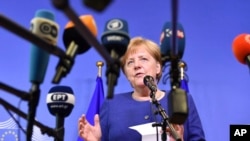The European Union is preparing for a two-day summit beginning Thursday in Brussels, as differences over immigration policy threaten to tear the bloc apart.
The differences were starkly illustrated Tuesday as a cargo ship that had rescued more than 100 migrants off Libya was given permission to dock in the Sicilian port of Pozzallo, having spent four days at sea as Italy initially refused to let the vessel dock. The town’s mayor said he had appealed directly to Italy’s government for help.
“Since time could have consequences on a humanitarian level, today I appealed to the Italian Interior Minister Matteo Salvini, who today decided to let the migrants disembark,” Pozzallo Mayor Roberto Ammatuna told reporters Tuesday.
Salvini, the head of Italy’s far-right "League" (la Lega) party that is in the coalition government with the Five Star movement, is leading a pan-European populist drive to toughen Europe’s asylum and immigration laws. Salvini visited Libya to discuss proposals Monday with counterparts in Tripoli, and reiterated Rome’s demands: blocking migrant boats and rescue vessels, the sharing of migrant quotas across the European Union, and asylum centers set up in Africa. Libya has refused to host such centers on its territory.
Italy’s hardline stance threatens a major rift with EU allies, says analyst Heather Grabbe, director of the Open Society European Policy Institute.
“Now, Salvini in particular would really like to have a monumental failure at EU level because that would suit his narrative about Europe, about migration, and about Italy itself, and about political elites. Because that’s really his story,” Grabbe told VOA.
Trying to keep the EU united is Europe’s traditional political core, the Franco-German alliance. Facing her own domestic pressures on immigration, Germany’s chancellor, Angela Merkel, convened an emergency meeting on migration Sunday in Brussels. In part, it only served to underline Europe’s divisions, as it was boycotted by several eastern EU countries that are refusing to take in quotas of refugees.
“In fact, migration is much less of an issue in real terms this year than last, because the number of migrants coming into the European Union has dropped by half. It’s a trickle in comparison with what happened in 2015-16. That doesn’t mean nothing should be done. In fact, the EU needs to have a much more comprehensive approach,” says Grabbe.
French President Emmanuel Macron has been highly critical of the Italian approach, straining relations between Paris and Rome. President Macron and his wife Brigitte arrived Tuesday at the Vatican for a meeting with Pope Francis.
France is pushing for EU member states to address other pressing issues at the summit, including reform of the eurozone and the future of European defense, as fears grow over the U.S. commitment to NATO. Nine EU states this week signed off on a joint European military force for rapid deployment in times of crisis.
Britain offered its backing to the force, hoping to maintain defense ties as it leaves the bloc. Progress in so-called Brexit talks has stalled, raising fears that Britain may leave the EU next March without a deal.
“Brexit I think is a fairly low priority for most of the other EU 27 (states). It is kind of a pain. It’s a technical question that requires a lot of bandwidth. But actually, there are these existential issues facing the European Union that actually have nothing to do with Britain, and in a way never have because they focus in particular on the eurozone and the (passport-free) Schengen area, neither of which Britain was part of anyway,” says analyst Hans Kundnani of policy institute Chatham House.
In his state of the union address last September, EU Commission President Jean-Claude Juncker spoke of a "wind in Europe’s sails". Nine months later, storm clouds are gathering that once more threaten to sink European unity - and some fear, the EU itself.

